On their mettle
Page 42
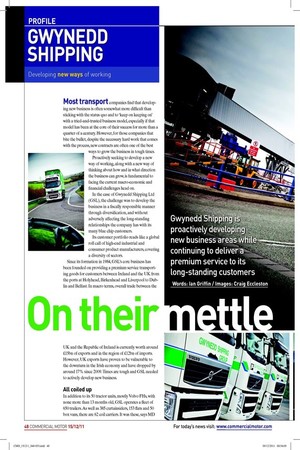
Page 44
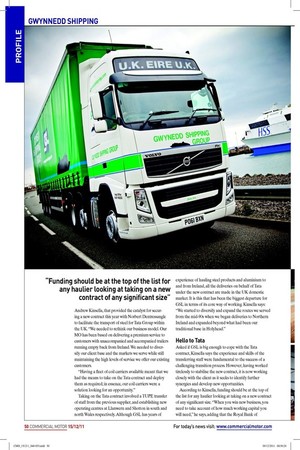
Page 45
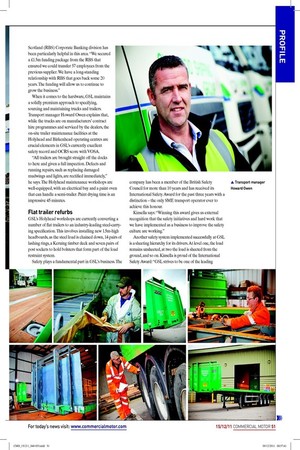
Page 46
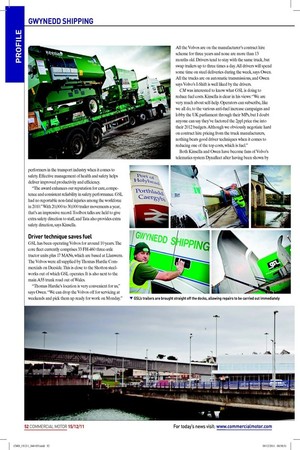
Page 47
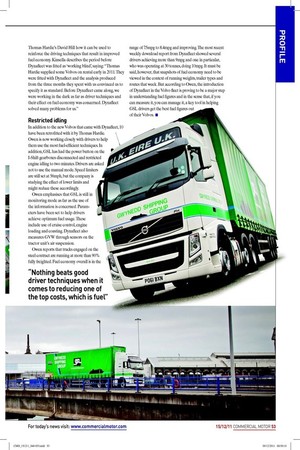
If you've noticed an error in this article please click here to report it so we can fix it.
Gwynedd Shipping is proactively developing new business areas while continuing to deliver a premium service to its long-standing customers
Words: Ian Griffin / Images: Craig Eccleston Most transport companies ind that developing new business is often somewhat more dificult than sticking with the status quo and to ‘keep on keeping on’ with a tried-and-trusted business model, especially if that model has been at the core of their success for more than a quarter of a century. However, for those companies that bite the bullet, despite the necessary hard work that comes with the process, new contracts are often one of the best
ways to grow the business in tough times.
Proactively seeking to develop a new way of working, along with a new way of thinking about how and in what direction the business can grow, is fundamental to facing the current macro-economic and inancial challenges head on.
In the case of Gwynedd Shipping Ltd (GSL), the challenge was to develop the business in a iscally responsible manner through diversiication, and without adversely affecting the long-standing relationships the company has with its many blue chip customers.
Its customer portfolio reads like a global roll call of high-end industrial and consumer product manufacturers, covering a diversity of sectors.
Since its formation in 1984, GSL’s core business has been founded on providing a premium service transporting goods for customers between Ireland and the UK from the ports at Holyhead, Birkenhead and Liverpool to Dublin and Belfast. In macro terms, overall trade between the UK and the Republic of Ireland is currently worth around £15bn of exports and in the region of £12bn of imports. However, UK exports have proven to be vulnerable to the downturn in the Irish economy and have dropped by around 17% since 2009. Times are tough and GSL needed to actively develop new business.
All coiled up
In addition to its 50 tractor units, mostly Volvo FHs, with none more than 13 months old, GSL operates a leet of 650 trailers. As well as 385 curtainsiders, 153 lats and 50 box vans, there are 62 coil carriers. It was these, says MD Andrew Kinsella, that provided the catalyst for securing a new contract this year with Norbert Dentressangle to facilitate the transport of steel for Tata Group within the UK. “We needed to rethink our business model. Our MO has been based on delivering a premium service to customers with unaccompanied and accompanied trailers running empty back from Ireland. We needed to diversify our client base and the markets we serve while still maintaining the high levels of service we offer our existing customers.
“Having a leet of coil carriers available meant that we had the means to take on the Tata contract and deploy them as required; in essence, our coil carriers were a solution looking for an opportunity.” Taking on the Tata contract involved a TUPE transfer of staff from the previous supplier, and establishing new operating centres at Llanwern and Shotton in south and north Wales respectively. Although GSL has years of experience of hauling steel products and aluminium to and from Ireland, all the deliveries on behalf of Tata under the new contract are made in the UK domestic market. It is this that has been the biggest departure for GSL in terms of its core way of working. Kinsella says: “We started to diversify and expand the routes we served from the mid-90s when we began deliveries to Northern Ireland and expanded beyond what had been our traditional base in Holyhead.”
Hello to Tata
Asked if GSL is big enough to cope with the Tata contract, Kinsella says the experience and skills of the transferring staff were fundamental to the success of a challenging transition process. However, having worked tirelessly to stabilise the new contract, it is now working closely with the client as it seeks to identify further synergies and develop new opportunities.
According to Kinsella, funding should be at the top of the list for any haulier looking at taking on a new contract of any signiicant size. “When you win new business, you need to take account of how much working capital you will need,” he says, adding that the Royal Bank of Scotland (RBS) Corporate Banking division has been particularly helpful in this area. “We secured a £1.5m funding package from the RBS that ensured we could transfer 57 employees from the previous supplier. We have a long-standing relationship with RBS that goes back some 20 years. The funding will allow us to continue to grow the business.” When it comes to the hardware, GSL maintains a solidly premium approach to specifying, sourcing and maintaining trucks and trailers. Transport manager Howard Owen explains that, while the trucks are on manufacturers’ contract hire programmes and serviced by the dealers, the on-site trailer maintenance facilities at the Holyhead and Birkenhead operating centres are crucial elements in GSL’s currently excellent safety record and OCRS score with VOSA.
“All trailers are brought straight off the docks to here and given a full inspection. Defects and running repairs, such as replacing damaged mudwings and lights, are rectiied immediately,” he says. The Holyhead maintenance workshops are well-equipped, with an electrical bay and a paint oven that can handle a semi-trailer. Paint drying time is an impressive 45 minutes.
Flat trailer refurbs
GSL’s Holyhead workshops are currently converting a number of lat trailers to an industry-leading steel-carrying speciication. This involves installing new 1.5m-high headboards, as the steel load is chained down, 14 pairs of lashing rings, a Keruing timber deck and seven pairs of post sockets to hold bolsters that form part of the load restraint system.
Safety plays a fundamental part in GSL’s business. The company has been a member of the British Safety Council for more than 10 years and has received its International Safety Award for the past three years with a distinction – the only SME transport operator ever to achieve this honour.
Kinsella says: “Winning this award gives us external recognition that the safety initiatives and hard work that we have implemented as a business to improve the safety culture are working.” Another safety system implemented successfully at GSL is a sheeting hierarchy for its drivers. At level one, the load remains unsheeted, at two the load is sheeted from the ground, and so on. Kinsella is proud of the International Safety Award: “GSL strives to be one of the leading performers in the transport industry when it comes to safety. Effective management of health and safety helps deliver improved productivity and eficiency.
“The award enhances our reputation for care, competence and consistent reliability in safety performance. GSL had no reportable non-fatal injuries among the workforce in 2010.” With 20,000 to 30,000 trailer movements a year, that’s an impressive record. Toolbox talks are held to give extra safety direction to staff, and Tata also provides extra safety direction, says Kinsella.
Driver technique saves fuel
GSL has been operating Volvos for around 10 years. The core leet currently comprises 33 FH-460 three-axle tractor units plus 17 MANs, which are based at Llanwern. The Volvos were all supplied by Thomas Hardie Commercials on Deeside. This is close to the Shotton steelworks out of which GSL operates. It is also next to the main A55 trunk road out of Wales.
“Thomas Hardie’s location is very convenient for us,” says Owen. “We can drop the Volvos off for servicing at weekends and pick them up ready for work on Monday.” All the Volvos are on the manufacturer’s contract hire scheme for three years and none are more than 13 months old. Drivers tend to stay with the same truck, but swap trailers up to three times a day. All drivers will spend some time on steel deliveries during the week, says Owen. All the trucks are on automatic transmissions, and Owen says Volvo’s I-Shift is well liked by the drivers.
CM was interested to know what GSL is doing to reduce fuel costs. Kinsella is clear in his views: “We are very much about self-help. Operators can subscribe, like we all do, to the various anti-fuel increase campaigns and lobby the UK parliament through their MPs, but I doubt anyone can say they’ve factored the 2ppl price rise into their 2012 budgets. Although we obviously negotiate hard on contract hire pricing from the truck manufacturers, nothing beats good driver techniques when it comes to reducing one of the top costs, which is fuel.” Both Kinsella and Owen have become fans of Volvo’s telematics system Dynaleet after having been shown by Thomas Hardie’s David Hill how it can be used to reinforce the driving techniques that result in improved fuel economy. Kinsella describes the period before Dynaleet was itted as ‘working blind’, saying: “Thomas Hardie supplied some Volvos on rental early in 2011. They were itted with Dynaleet and the analysis produced from the three months they spent with us convinced us to specify it as standard. Before Dynaleet came along, we were working in the dark as far as driver techniques and their effect on fuel economy was concerned. Dynaleet solved many problems for us.”
Restricted idling
In addition to the new Volvos that came with Dynaleet, 10 have been retroitted with it by Thomas Hardie.
Owen is now working closely with drivers to help them use the most fuel-eficient techniques. In addition, GSL has had the power button on the I-Shift gearboxes disconnected and restricted engine idling to two minutes. Drivers are asked not to use the manual mode. Speed limiters are still set at 56mph, but the company is studying the effect of lower limits and might reduce these accordingly.
Owen emphasises that GSL is still in monitoring mode as far as the use of the information is concerned. Param eters have been set to help drivers achieve optimum fuel usage. These include use of cruise control, engine loading and coasting. Dynaleet also measures GVW through sensors on the tractor unit’s air suspension.
Owen reports that trucks engaged on the steel contract are running at more than 90% fully freighted. Fuel economy overall is in the
range of 7.5mpg to 8.4mpg and improving. The most recent weekly download report from Dynaleet showed several drivers achieving more than 9mpg and one in particular, who was operating at 30 tonnes, doing 10mpg. It must be said, however, that snapshots of fuel economy need to be viewed in the context of running weights, trailer types and routes that week. But according to Owen, the introduction of Dynaleet in the Volvo leet is proving to be a major step in understanding fuel igures and in the sense that, if you can measure it, you can manage it, a key tool in helping GSL drivers get the best fuel igures out of their Volvos. ■



















































